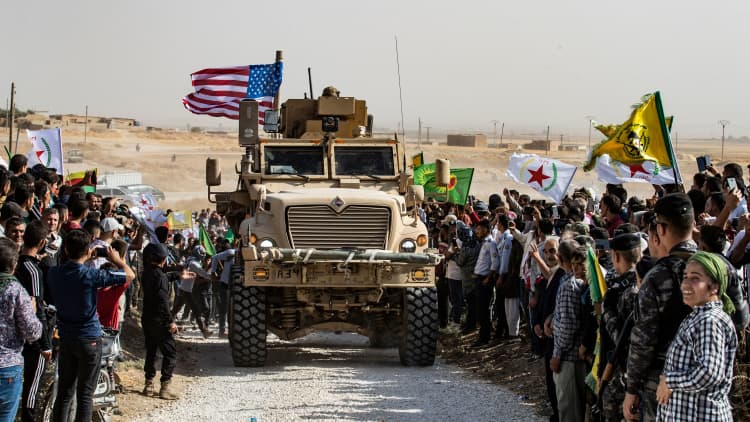
President Donald Trump's decision to withdraw the remaining U.S. troops from northern Syria will play directly into the hands of Russian President Vladimir Putin, according to several analysts.
The sudden pulling back of 1,000 U.S. soldiers in the area has freed Turkish forces and allied militia to carry out an offensive against Kurdish forces who had been allied with American troops in the fight against the so-called Islamic State.
According to NBC News, which cited U.S. intelligence, Turkey's forces have now teamed up with Arab militia which includes former members of IS and al-Qaeda to attack the Kurds. There are an estimated 2 million Kurds in northern Syria.
Trump and his Treasury Secretary Steven Mnuchin have threatened Turkey with "powerful" sanctions, should Ankara overreach in northern Syria. But in an apparent contradiction, Trump tweeted Sunday that whoever wants to fight for either Turkey or the Kurds, should be free to do so.
https://twitter.com/realDonaldTrump/status/1183369133301391365
Speaking to CNBC's Hadley Gamble in Abu Dhabi Saturday, Saudi Arabian Prince Turki Al-Faisal said it was "surprising America would abandon her allies in Syria," adding that for the U.S. to "fold up their tents and silently fade away," was not the right thing to do.
Trump departs, Putin steps in
Ahead of his planned trip to Saudi Arabia and the United Arab Emirates this week, Putin has said he can help to soothe tensions in the Gulf region. Analysts believe the Russian president will look to expand this brief beyond Iran to include Turkey's actions in Syria.
Kurdish forces have already called on Syrian President Bashar Assad to deploy along the border with Turkey. Assad, an ally of Putin, may look to Moscow for at least tacit consent.
Former U.S. Assistant Secretary of Commerce, Mary Jo Jacobi, told CNBC's "Street Signs" Monday that she would be closely watching Putin's words this week to understand if Russia aims to step in as the U.S. resets its Middle East influence.
"My question is will Putin emerge as Putin the peacemaker and try to fill the void as the U.S. is leaving?"
Jacobi said Trump had raised questions about U.S. reliability as an ally, adding it was difficult to read the U.S. president's real strategy.
Analysts at Verisk Maplecroft agreed that trust in Washington's foreign policy is eroding and the U.S. no longer acts as "a predictable peace broker."
In a note Monday, the foreign policy researchers claimed that a misstep by Trump has allowed Turkish President Recep Tayyip Erdogan to proceed with a military offensive and give Putin a greater foothold in the region.
"The role of watchful observer will allow Russia to react opportunistically to preserve its assets in Syria, and the potentially more valuable bilateral relationship with Turkey."
Now watch: US pulls troops out of northern Syria



